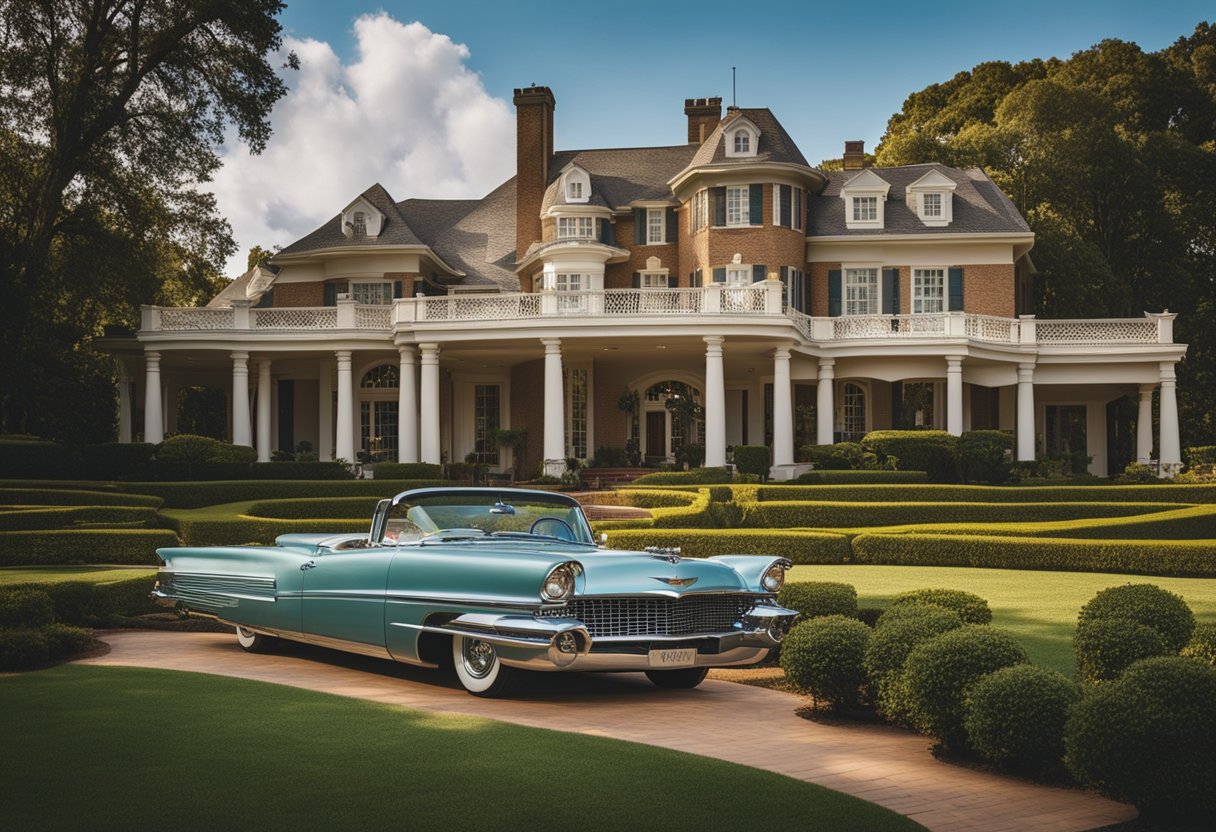Elvis Presley’s music, image, and legacy continue to captivate fans worldwide decades after his death. People often wonder who owns Elvis Presley. They’re really asking about who controls his estate, music rights, and the iconic Graceland mansion.
Elvis Presley Enterprises (EPE) manages the King’s assets. It was created by “The Elvis Presley Trust.” The trust also oversees Graceland and his intellectual property.

After Elvis died, his estate passed to his only child, Lisa Marie Presley. When Lisa Marie turned 25 in 1993, she inherited Graceland and became its sole owner until her death. The music rights situation is different. Sony Music Entertainment now owns Elvis’s recordings after acquiring RCA Records through corporate mergers.
The Elvis Presley Trust has evolved over time, with ownership changes affecting how the King’s legacy is managed. Today, Elvis’s granddaughter Riley Keough represents the family’s interests in the estate. She continues to preserve his memory for future generations of fans.
Key Takeaways
- Elvis Presley Enterprises manages Graceland and Elvis’s intellectual property under the direction of the Elvis Presley Trust.
- Elvis’s recordings are owned by Sony Music Entertainment, while Graceland passed from Lisa Marie Presley to her daughter Riley Keough.
- The management of Elvis’s estate has changed hands several times since his death, balancing commercial interests with preserving his legacy.
Elvis Presley’s Legacy and Ownership
The King of Rock and Roll left behind a complex legacy that continues to generate millions in revenue decades after his death. Ownership of Elvis Presley’s estate, music rights, and business interests has evolved through family transitions and corporate arrangements.
The Presley Family’s Role
Elvis Presley’s estate initially passed to his father Vernon, then to his daughter Lisa Marie Presley after Vernon’s death. Lisa Marie retained 100% sole personal ownership of Graceland Mansion and its original 13-acre grounds, along with her father’s personal effects throughout her life.
When Lisa Marie Presley passed away in January 2023 at the age of 54, ownership questions arose again. The future of Elvis’s legacy entered a new chapter with her death.
Riley Keough, Lisa Marie’s eldest daughter, became a key figure in preserving the Presley legacy. She now serves as the sole trustee of her grandfather’s estate. She has taken on the responsibility of maintaining Elvis’s cultural impact for future generations.
Elvis Presley Enterprises
Elvis Presley Enterprises (EPE) manages the business side of Elvis’s legacy, handling licensing, merchandising, and operations at Graceland. The company has transformed Elvis from simply a musician to a global brand.
Graceland Holdings LLC, led by managing partner Joel Weinshanker, owns the majority stake in EPE. This corporate structure oversees the commercial aspects of Elvis’s image while the Presley family maintains connections to his personal property.
Elvis’s music catalog ownership is separate from his estate. RCA Records originally owned all of Elvis’s music recordings, but the label was acquired by BMG in the 1980s. Later, BMG merged with Sony Music Entertainment in 2004, placing Elvis’s recorded music under the Sony umbrella.
EPE continues to develop new ways to keep Elvis relevant. They create exhibitions, themed experiences, and digital initiatives that introduce his artistry to new generations.
Graceland: The Iconic Home of Elvis
Graceland stands as one of America’s most visited private homes, drawing Elvis fans from around the world to Memphis, Tennessee. The mansion and grounds reflect the personality and taste of the King of Rock and Roll while now serving as both memorial and museum.
Ownership of Graceland
Elvis Presley purchased Graceland in 1957 for $100,000, making it his home until his death in 1977. The estate was originally part of a 500-acre farm owned by the S.C. Toof family for generations before Elvis acquired it.
After Elvis’s death, ownership transferred to his estate. For many years, Graceland was managed by Elvis Presley Enterprises (EPE), which was “wholly owned by the Elvis Presley Trust/Lisa Marie Presley until 2005.” The management structure changed that year with partial outside ownership of operations while the family retained ownership of the actual estate.
Following Lisa Marie Presley’s death, her daughter Riley Keough became Graceland’s sole owner. As Elvis’s granddaughter, Riley has shared fond memories of her childhood spent on the hallowed grounds of the estate.
Visitors and Cultural Impact
Graceland welcomes hundreds of thousands of visitors annually, making it one of Shelby County’s biggest tourist attractions. Fans can tour the mansion’s famous rooms including:
- The iconic Jungle Room with green shag carpet
- The Meditation Garden where Elvis and family members are buried
- The Trophy Building displaying his gold records and jumpsuits
The property has grown beyond just the mansion to include museums housing Elvis’s automobiles, private jets, and extensive collections of memorabilia. When Elvis bought it, Graceland was valued at $100,000, but by the time of his death 20 years later, it was reportedly worth $5 million.
Graceland received National Historic Landmark status in 2006, cementing its place in American cultural history. The property continues to hold annual events including Elvis Week, drawing devoted fans to Memphis from across the globe.
The Business Behind the King

Elvis Presley’s legacy continues to generate significant revenue long after his death. The business operations involve complex ownership structures that manage his image, music, and estate.
Licensing and Merchandising Ventures
The Elvis Presley Trust created Elvis Presley Enterprises (EPE) to handle business assets including Graceland. This company controls the commercial use of Elvis’s name and likeness.
In 2004, businessman Robert F.X. Sillerman bought 85% of EPE for $114 million. His company CKX made this bold investment believing in the lasting power of Elvis’s brand.
Elvis merchandise includes everything from t-shirts to collectibles. The licensing rights allow approved manufacturers to create products bearing his image or signature.
EPE also manages Graceland tours, which attract over 500,000 visitors annually. This makes it the second most-visited home in America after the White House!
Authentic Brands Group Partnership
In 2013, Authentic Brands Group (ABG) partnered with the Presley family to manage Elvis’s intellectual property. This deal didn’t include Graceland itself but focused on his image rights.
ABG specializes in managing celebrity brands and has helped modernize Elvis’s appeal to younger generations. They’ve expanded Elvis-themed products into new markets worldwide.
The partnership has created innovative licensing deals like Elvis-themed restaurants, hotels, and entertainment venues. These ventures keep the King’s legacy commercially vibrant.
Sony Music Entertainment owns most of Elvis’s music recordings through their ownership of RCA Records. This separate arrangement shows how Elvis’s business interests are divided among different entities.
Financial Management and Controversies
Elvis Presley’s financial affairs were marked by poor decisions, high expenses, and questionable management practices. Despite generating hundreds of millions in revenue throughout his career, money issues plagued the King of Rock and Roll both during his lifetime and after his death.
Colonel Tom Parker’s Management
Colonel Tom Parker served as Elvis Presley’s manager for over two decades, but his financial decisions have been widely criticized. When Elvis died in 1977, he had less than $1 million in the bank despite his enormous earnings. This financial shortfall raised serious questions about Parker’s management.
Parker negotiated a deal that gave him an unusually high 50% of Elvis’s earnings—far above the industry standard of 10-15%. He was also an illegal immigrant from the Netherlands who never obtained U.S. residency, which may explain why he never allowed Elvis to tour internationally.
The Colonel’s gambling addiction further complicated matters. He often used Elvis’s contracts as collateral for loans to support his gambling habits, putting his client’s financial interests at risk.
Barry Siegel and Trust Issues
After Elvis’s death, his estate passed to his daughter, Lisa Marie Presley. In 2005, she hired business manager Barry Siegel to oversee the Elvis Presley Trust. Under Siegel’s management, Lisa Marie sold 85% of Elvis Presley Enterprises (EPE) to CKX Inc., retaining only 15% ownership.
This deal included a 90-year lease on Graceland and rights to Elvis’s name and image. While it brought immediate cash, the long-term value of Elvis’s legacy was potentially compromised.
By 2016, Lisa Marie claimed the $100 million trust had dwindled to just $14,000, leading to a bitter legal battle with Siegel. She accused him of mismanaging her inheritance through poor investments and excessive fees.
Fraud Accusations
Both men responsible for managing Elvis’s fortune faced serious fraud accusations. Colonel Parker was accused of financial abuses that exemplify the fraud triangle – opportunity, pressure, and rationalization.
Parker allegedly withheld information about better offers from Elvis and manipulated contracts to his benefit. He even continued profiting from Elvis’s image rights long after the singer’s death through questionable agreements.
Barry Siegel faced lawsuits claiming he defrauded the Presley estate through high-risk investments and self-serving financial decisions. Lisa Marie specifically accused him of hiding the true financial condition of the trust while continuing to collect his management fees.
These accusations highlight how Elvis’s enormous earning potential was repeatedly compromised by those entrusted with protecting his financial interests.
Estate Evolution

The ownership of Elvis Presley’s estate has changed hands several times since the music icon’s death in 1977, involving complex business deals and family interests.
Transition of Ownership
Initially, Elvis Presley’s estate was managed by his father Vernon, who passed away in 1979. The estate then transferred to his daughter Lisa Marie Presley. Her mother Priscilla served as executor until Lisa Marie turned 25.
In 2005, a significant shift occurred. A company called CKX bought 85% of Elvis Presley Enterprises. This deal changed the business structure while allowing the Presley family to maintain ownership of Graceland mansion and its original contents.
Later, Authentic Brands Group (ABG) became the custodians of the Elvis Presley estate. They now control the rights to Elvis’s image and likeness, which they license for various projects like the “Elvis Evolution” immersive experience.
Naussany Investments Involvement
Naussany Investments entered the picture during later ownership transitions of the Elvis Presley business interests. Their involvement came after several corporate restructurings had already taken place.
The investment group showed interest in the commercial potential of Elvis’s legacy. They recognized the ongoing value of Elvis Presley Enterprises, which manages Graceland operations and related properties.
While the Presley family continues to have connections to Elvis’s legacy, the commercial rights structure has become increasingly complex with multiple corporate entities involved.
The music rights situation adds another layer. RCA Records originally owned Elvis’s recordings before BMG acquired the label in the 1980s. Later, BMG merged with Sony Music Entertainment in 2004, further separating different aspects of Elvis’s estate.




